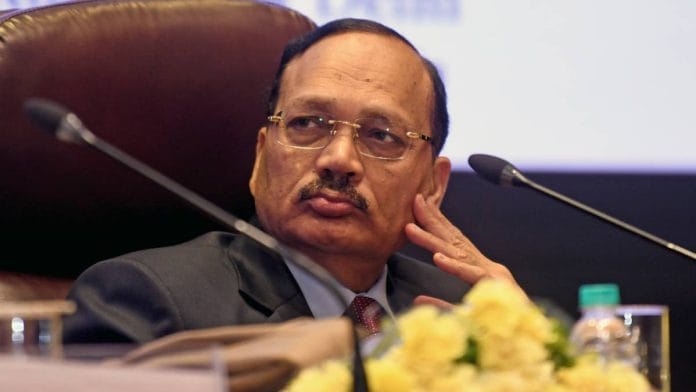New Delhi: Amid the ongoing debate over appointments in the higher judiciary, senior Supreme Court judge Justice Surya Kant has defended the current collegium system of appointing judges, saying that it serves as a crucial institutional safeguard by preserving the judiciary’s autonomy.
Speaking at Seattle University in the US this week on the subject ‘The Quiet Sentinel: Courts, Democracy, and the Dialogue Across Borders’, Justice Kant addressed the appointment system’s benefits and how it insulated the judiciary from executive interference.
The collegium system, he said, “significantly limits interference by the Executive and Legislature, thereby preserving the Judiciary’s autonomy and insulating judges from extraneous pressures that could otherwise compromise their impartiality”.
While the system “has been subject to sustained criticism—particularly regarding the opacity of its deliberative processes and the lack of publicly articulated criteria—recent efforts by the Supreme Court signal a growing commitment to enhancing transparency and public confidence in it”, the judge said.
Justice Surya Kant’s remarks about the sanctity of the collegium system come at a time when the judiciary has been under public glare, particularly after the Justice Yashwant Varma cash controversy.
Justice Surya Kant is likely to become the Chief Justice of India in November this year.
Also Read: 4 letters, 1 response — how Modi govt’s tussle with SC on judge appointments played out over 7 yrs
‘Courts cannot function as mere referees’
Speaking in the US, Justice Surya Kant admitted that the judiciary has at times breached the fine line between judicial activism and judicial overreach, but at the same time highlighted the institution’s “discernible shift” towards self-restraint in select domains.
“The court has increasingly sought to nudge rather than command, and to engage with other branches of government in efforts to increase dialogic remedies. This evolving balance reflects an awareness that judicial authority is most enduring when it is exercised with a sense of humility—when the court is seen not as an omnipotent arbiter, but as a co-traveller in the democratic journey, grounded in constitutional values,” the judge said during his session.
He referred to pro-active interventions by courts in India which further constitutional compassion, and talked about the crucial role played by the Indian judiciary “in shaping this very democracy’s moral spine”, while emphasising its commitment towards “constitutional morality”.
And in a “constitutional democracy” such as India, he added, majorities are checked, minorities are protected, and principles cannot be sacrificed at the altar of popularity. “In such a system, courts cannot function as mere referees,” the judge asserted.
Giving an answer to the often-asked question of whether “judicial creativity is a virtue or a vice?” he said: “The answer, I believe, lies in intent and integrity. When courts act to empower the powerless, grounded in constitutional text and moral clarity, they do not usurp democracy—they deepen it.”
He recalled the “serious challenges” the judiciary faced during the Emergency era and also moments when the institution exhibited “troubling deference” to executive power. All these phases, he pointed out, strained the institution but also gave way to a renewed judicial consciousness, as the judiciary traversed through periods of profound trial and transformation.
“The judiciary’s evolving relationship with its own independence lies at the very heart of how India’s vast, pluralistic democracy continues to function with remarkable cohesion. It is not merely the existence of judicial independence that is noteworthy, but rather the degree and contours of that independence—how it is asserted, negotiated, and exercised—that renders the Indian experience particularly distinctive within the global constitutional landscape,” he said.
He stressed that “in a democracy as vast and diverse as India’s, it is only when the judiciary wears its power lightly, and its conscience visibly, that it can remain not only the last word, but also a trusted voice among many in our collective democratic journey”.
In India, he added, the judiciary has kept alive the promise of justice, which is paramount. But when compared to the tasks carried out by other institutions, the one performed by it is often a “thankless one”, irrespective of its importance.
“The judiciary is not a saviour; it is a sentinel. It does not march. It watches. And when necessary, it speaks—not to please, but to preserve,” he explained.
A word of caution
Earlier this week, the judge also visited the Washington State Supreme Court Temple of Justice and elaborately dealt with the Supreme Court’s role in defending free speech rights, saying it had laid down that “pre-censorship and vague notions of public order cannot trump the right to free speech”.
Both Indian and American judiciaries, he said, have “consistently pushed back against the temptation to suppress dissent under misguided and deceptive notions that the Executive may hold… both our systems were designed not to trust power blindly, but to restrain it”.
The same day, the judge engaged in a fireside chat at Microsoft Corporation headquarters, where he touched upon the adoption of technology in the Indian justice delivery system.
Here, he also discussed the perils of high dependence on technology and called for constant checks on the use of new systems such as artificial intelligence so that social justice and equity are not compromised.
“Transparency, equity, responsibility, and respect for human dignity must not be afterthoughts, but the pillars upon which all technological advancement rests,” he said.
“Technology, if left unchecked, can reflect and reinforce societal inequities. AI is not a perfect technology and it can perhaps never replace the human element that the entire Rawlsian theory of justice hinges on,” he added.
(Edited by Nida Fatima Siddiqui)
Also Read: In a first, SC releases list disclosing proposed HC judges’ ties to sitting & former judges







Of course he would defend the collegium system. It benefits him and his family. His son/daughter can now rightfully aspire to be a Supreme Court judge – courtesy the legal network built by their father.
The milords have secured the future of their progeny successfully for all generations to come through the collegium system.